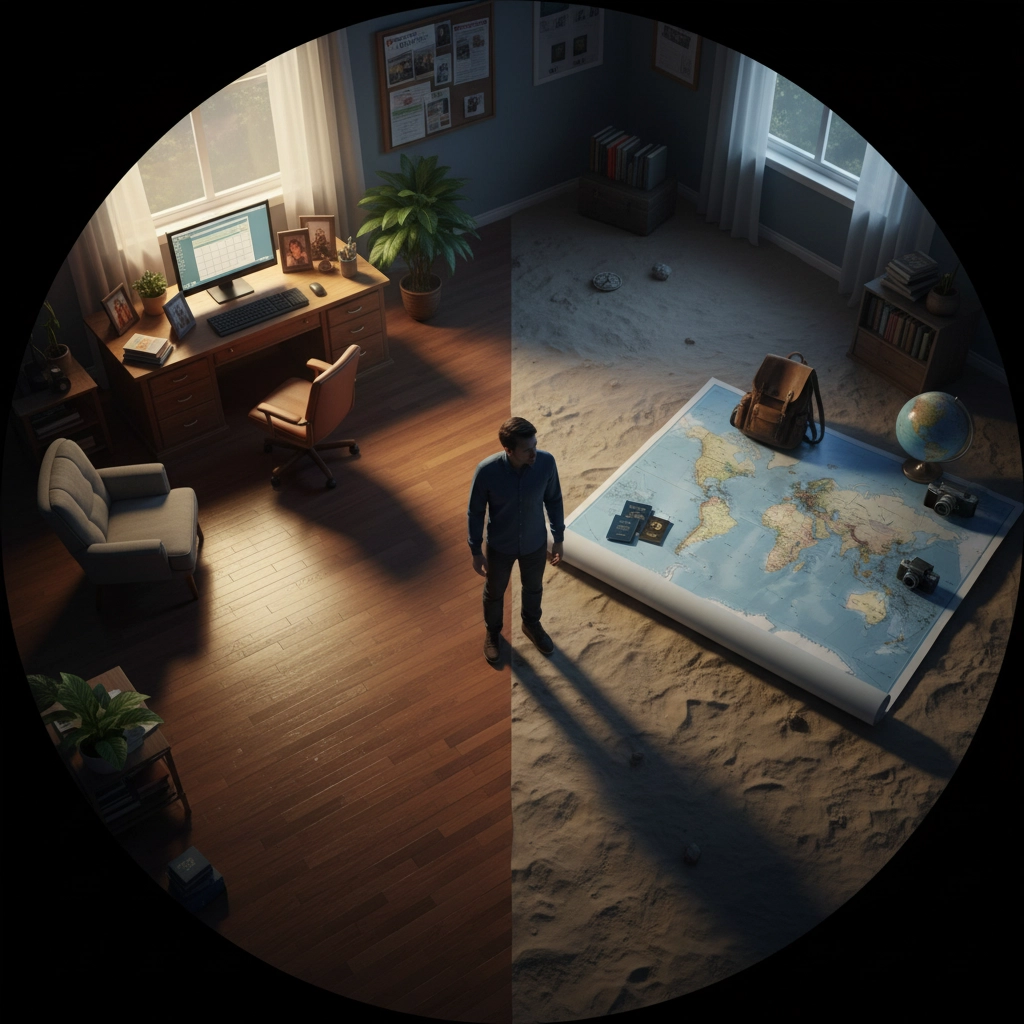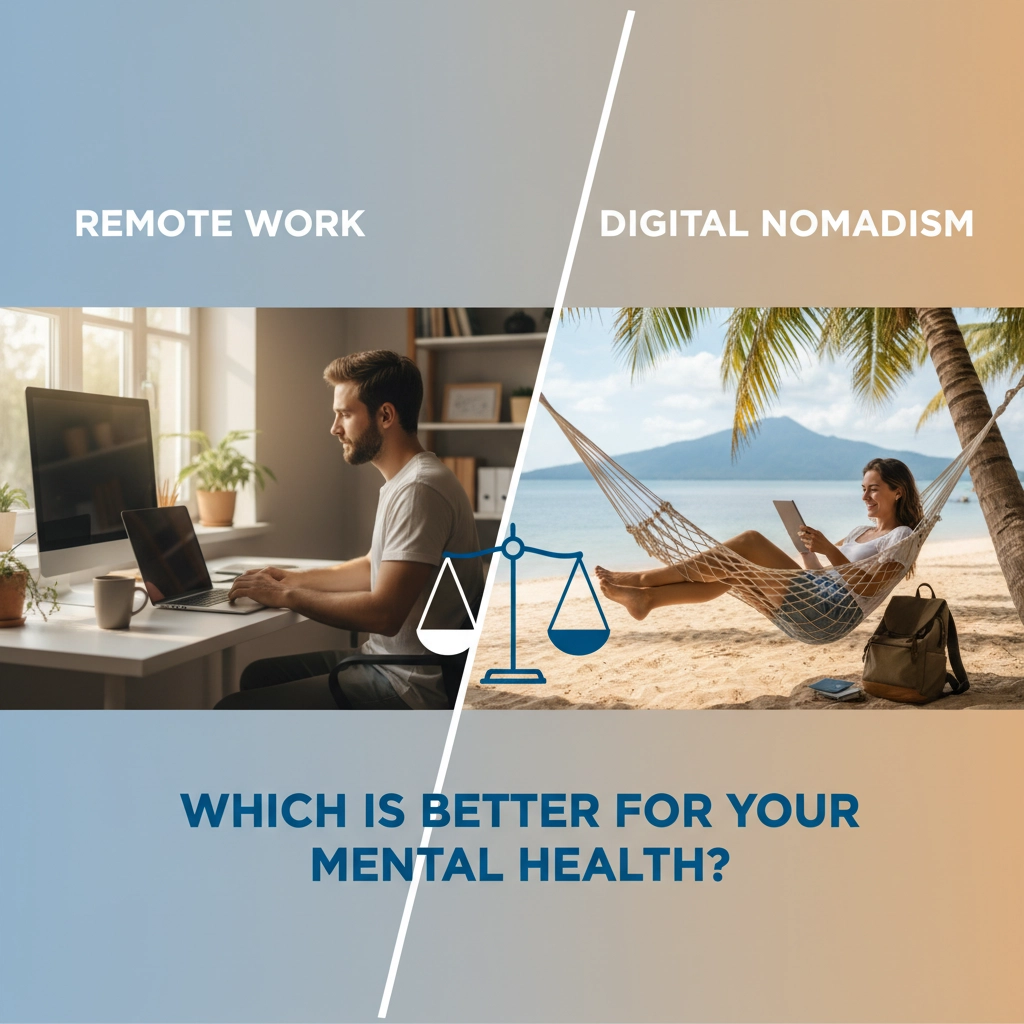Here's something that'll blow your mind: 73% of remote workers say their mental health improved after ditching the office. But before you pack your laptop and book a flight to Bali, there's more to this story.
The choice between remote work and digital nomadism isn't just about where you work. It's about how your brain handles freedom, stability, and connection. Let's break down what each lifestyle actually does to your mental health.
What Remote Work Does to Your Brain
Remote work hits different than you'd expect. Stanford found that people working from home are 13% more productive than their office counterparts. That's not just because you can work in pajamas (though that helps).
The real magic happens when you eliminate your commute. No more sitting in traffic thinking about all the things you could be doing. No more cramming into subway cars with strangers who forgot deodorant. Your stress levels drop before you even start working.
But here's where it gets tricky. 20% of remote workers say loneliness is their biggest struggle. Sarah, a marketing manager from Portland, told me she started talking to her houseplants just to hear conversation during the day. "I realized I'd gone three days without speaking to another human face-to-face," she laughed. "My succulent became my best friend."

The isolation hits harder than most people expect. You lose those random coffee conversations that spark creativity. No more bumping into colleagues and solving problems on the spot. Your world shrinks to the size of your home office.
Here's what remote work typically brings:
• Better work-life balance (when done right)
• More control over your environment
• Increased productivity and focus
• Reduced stress from commuting
• Risk of social isolation
• Blurred boundaries between work and personal life
The Digital Nomad Mental Health Reality
Digital nomadism looks incredible on Instagram. Laptops on beaches, working from coffee shops in Prague, living your best life while everyone else is stuck in cubicles. The reality? It's way more complicated.
The constant movement messes with your head in ways you don't see coming. You're always the outsider, always starting over. Making real connections becomes nearly impossible when you're leaving every few months.
Jake spent two years as a digital nomad before burning out completely. "I thought I wanted adventure," he said. "Turns out what I actually wanted was to feel like I belonged somewhere. After constantly introducing myself as 'the guy who's leaving next month,' I realized I was sabotaging my own relationships."

The uncertainty never stops. Will your Airbnb have good WiFi? Can you extend your visa? Is that weird noise your laptop makes going to cost you $1,200 in repairs while you're 8,000 miles from home?
Your sleep schedule becomes a joke. Video calls with clients back home at 3 AM. Trying to focus on work while your temporary roommates throw a party. The excitement of new places battles constantly with the exhaustion of never settling down.
Financial stress hits different when you're nomadic. One bad month means you're stuck in an expensive city with no backup plan. Every expense gets calculated against your remaining travel budget. That spontaneous weekend trip your new friends planned? You're doing mental math instead of having fun.
The Numbers Don't Lie
Let's get real about what the research shows. Remote workers report higher job satisfaction, but 40% struggle with unplugging after work. Digital nomads experience more depression and anxiety than traditional remote workers, mainly due to instability and isolation.
The productivity difference is stark. Remote workers maintain consistent output because they control their environment. Digital nomads? Their productivity swings wildly based on internet quality, noise levels, and how many Instagram-worthy distractions surround them.

Relationship maintenance tells the whole story. Remote workers often strengthen local relationships because they're more available for family dinners and friend hangouts. Digital nomads? They watch friendships fade through delayed text responses and missed video calls due to time zone chaos.
Sleep quality matters more than you think. Remote workers generally sleep better because they control their environment and don't deal with jet lag. Nomads constantly battle disrupted sleep cycles, new noises, and uncomfortable beds.
Which Path Should You Pick?
Your personality matters more than the lifestyle looks on paper. If uncertainty gives you panic attacks, digital nomadism will destroy your mental health. If routine makes you feel trapped, remote work might leave you restless and unfulfilled.
Consider your support system. Strong local relationships make remote work shine. You get flexibility without losing your people. Weak local ties? You might find nomadism gives you the push to build new connections, even if they're temporary.

Think about your work style. Do you need consistent routines to be productive? Remote work wins. Do you get energized by new environments and challenges? The nomad life might fuel your creativity.
Financial stability changes everything. Remote work with a steady paycheck reduces stress. Nomadism on a shoestring budget amplifies every money worry and turns minor setbacks into major crises.
Here's what nobody talks about: you can switch. Start with remote work to build your skills and savings. Test nomadism for a few months. Many people find their sweet spot alternating between periods of stability and adventure.
The mental health winner isn't the lifestyle itself. It's the one that matches who you actually are, not who you think you should be.
What's driving your desire to change how you work – are you running toward something better, or just trying to escape what you have now?







